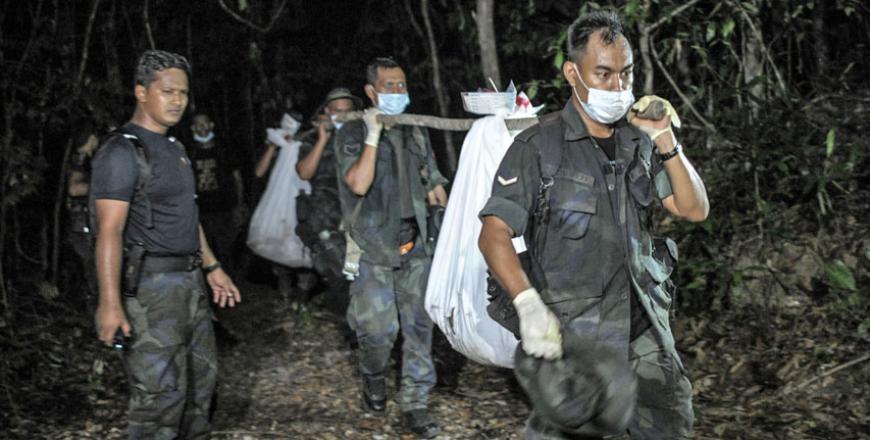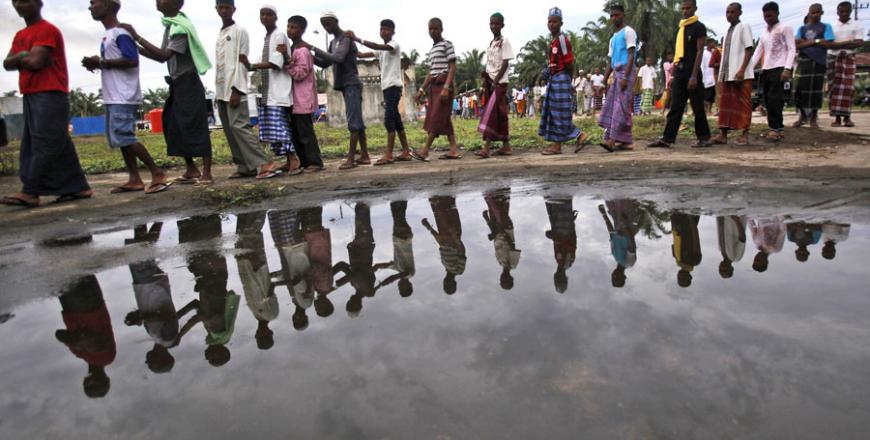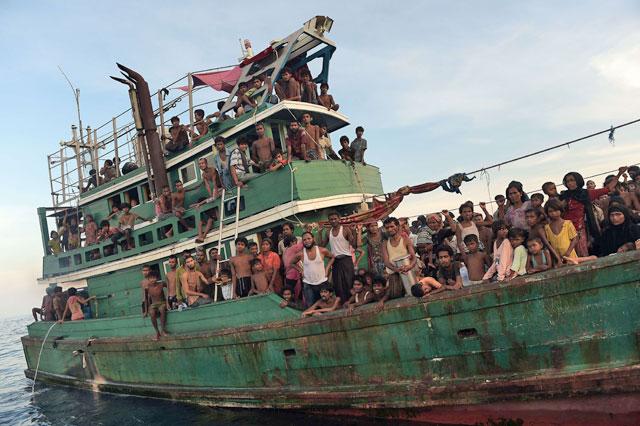You are here
Malaysia removes bodies from jungle on eve of people-smuggling talks
By AFP - May 28,2015 - Last updated at May 28,2015

Royal Malaysia Police personnel carry exhumed human remains recovered from the jungle in the Malaysian northern state of Perlis, which borders Thailand in Wang Kelian on Thursday (AFP photo)
WANG KELIAN, Malaysia — Malaysian police Thursday removed the remains of nine people from jungle camps near the Thai border where an estimated 139 bodies are believed to have been buried in a still unfolding people-smuggling crisis in Southeast Asia.
The skeletal remains were carried in white cloth bags tied to wooden poles to the border town Wang Kelian on the eve of an international meeting in Thailand on the desperate situation of refugees and migrants fleeing Myanmar and Bangladesh.
Some of the bags clearly showed human contours. A Malaysian police statement said Thursday’s recovery brought the total number of remains removed from the camps to 13 persons which would undergo post-mortem examination by pathologists.
The abandoned sites in Malaysian territory were discovered on the weekend after the massive scale of human smuggling was exposed by a Thai crackdown on trafficking networks, which has left thousands of desperate people stranded at sea on rickety boats.
“Based on the size of the graves, and after the area was cleared... we have a clearer indication — single grave, single person,” Malaysian Deputy Home Minister Wan Junaidi Tuanku Jaafar said in Wang Kelian.
Malaysia previously said it had discovered 139 grave sites. When asked by AFP if he now believed there were 139 bodies in total, Wan Junaidi said: “Yes.”
Thailand is hosting a regional meeting on Friday to address the crisis, which has seen more than 3,500 Bangladeshi economic migrants and stateless Rohingya Muslims from Myanmar arrive on Thai, Malaysian and Indonesian soil.
Thai authorities acted after discovering some 33 bodies in mass graves in camps in the country’s south.
“This is not only Malaysia’s problem, [it is] an international problem as people come from Bangladesh and Myanmar,” Wan Junaidi said.
“It is ASEAN’s problem,” he added, referring to the Southeast Asian grouping that includes Malaysia, Myanmar and Thailand.
Officials said a Malaysian rescue force of six ships and a helicopter carrying humanitarian supplies on Thursday spotted two boats suspected to be carrying more than 40 Rohingya off the resort island of Langkawi. But the boats were in Thai waters and avoided contact with the Malaysian flotilla.
White shrouds and camphor
The camps on Malaysia’s side of the border, which could have been capable of housing hundreds of people, drew allegations that authorities and residents had turned a blind eye to the lucrative business.
Wan Junaidi said initial investigations showed the bodies were wrapped in shrouds and their resting places marked with wooden sticks. Camphor was also found at the graves.
“It seems like proper burial, the bodies were wrapped in white cloth. It is like the Muslim burial... some are shallow graves, not all,” he told reporters.
Wan Junaidi said Malaysian security forces had not been patrolling the area because it was thought to be inaccessible but began surveying it after the discovery of the graves in Thailand.
Relatively prosperous Malaysia, which has a Muslim majority, has long been a favoured destination for Rohingya, who often travelled to Thailand by boat, then overland to northern Malaysia.
Pressure on Suu Kyi
In an interview published Thursday, the Dalai Lama urged fellow Nobel Peace Prize laureate Aung San Suu Kyi to help the Rohingya.
“It’s very sad... I hope Aung San Suu Kyi, as a Nobel laureate, can do something,” the Tibetan Buddhist spiritual leader told The Australian newspaper.
The Dalai Lama said she must speak up, and that he had already appealed twice to her in person since 2012, when deadly sectarian violence in Myanmar’s Rakhine state pitted the Rohingya against local Buddhists.
Observers say the Myanmar opposition leader may be reticent about the Rohingya issue in order to avoid alienating voters among Myanmar’s Buddhist majority ahead of elections slated for November.
Predominantly Muslim Bangladesh, meanwhile, said it was moving to set up seven special courts across the country to try suspects charged with trafficking.
Bangladesh shares a border with Myanmar along the Bay of Bengal.
Wan Junaidi on Thursday confirmed that Malaysian police are investigating 12 of their own officers over suspicion of involvement, with two “suspected of transporting the people [migrants]”.
“We are investigating Rohingya in Malaysia too,” he said.
The United States on Wednesday backed the investigation, calling for a “transparent, credible and expeditious effort” that will lead to prosecutions.
Campaign group Human Rights Watch said Friday’s meeting in Thailand involving 17 countries should “reach bindings agreements to save people at sea” and permit them to “disembark without conditions”.
Related Articles
Malaysia has found 139 graves, and signs of torture, in more than two dozen squalid human trafficking camps suspected to have been used by gangs smuggling migrants across the border with Thailand, the country's police chief said on Monday.
ALOR SETAR, Malaysia — Malaysia said Sunday it had found mass graves feared to contain the bodies of Bangladeshi and Rohingya migrants at th
Rohingya and Bangladeshis abandoned at sea by traffickers had nowhere to go Thursday as Malaysia turned away two crammed migrant boats and Thailand kept at bay a large vessel with hundreds of hungry people.



















